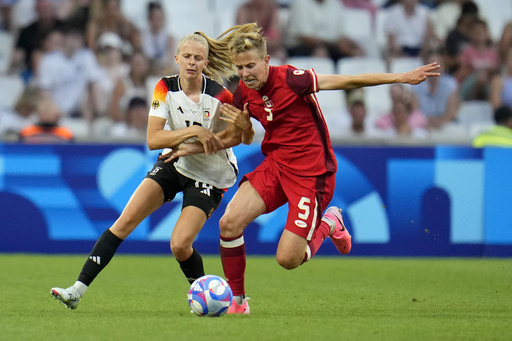
President Donald Trump is poised to escalate his campaign against transgender athletes by addressing the International Olympic Committee (IOC).
On Wednesday, during the signing of an executive order that aims to prohibit transgender athletes from participating in women’s sports, Trump expressed that his administration aims to compel the IOC to “alter everything related to the Olympics and this ludicrous subject” in preparation for the 2028 Summer Games set to take place in Los Angeles.
This executive order grants the Secretary of State’s office the authority to advocate for changes in the IOC’s regulations concerning Olympic events. The goal is to “foster fairness, safety, and the well-being of female athletes” by ensuring that eligibility for women’s sports is determined by sex rather than by gender identity or testosterone levels.
Additionally, the order instructs the Secretary of State and the Department of Homeland Security to “evaluate and modify, if necessary, policies concerning the entry of males wishing to compete in women’s sports.” Notably, there is currently no documented evidence of male athletes competing in women’s events at the Olympics.
Former IOC President Thomas Bach commented in December that there was “great confidence” among Olympic organizers about collaborating with the Trump administration. Trump initially supported Los Angeles’s bid for the 2024 Olympic Games, which were ultimately awarded to Paris.
Officials affiliated with the LA28 organizing committee have yet to provide a response to inquiries regarding this matter. Reports indicate that LA28 chairman Casey Wasserman met with Trump in Florida last month, stating that both parties are eager to ensure the successful execution of the Games.
So far, the IOC has largely refrained from engaging in the dialogue surrounding transgender participation, opting to allow individual sport governing bodies to establish their own criteria for participation based on gender.
The regulations vary significantly; for example, World Aquatics enforces stringent policies, while the guidelines from World Triathlon are more lenient.
The IOC’s position may see substantial shifts soon, especially following Bach’s departure. Potential successors include former athlete Sebastian Coe, who leads World Athletics. Coe has been vocal in his support for restricting competition in women’s sports to cisgender women.
Two years ago, Coe’s track and field organization prohibited transgender athletes from international events, aligning with similar regulations in swimming. They instituted new protocols requiring certain athletes to undergo hormone-suppressing treatments for six months to qualify for competition.
The discourse surrounding transgender athletes intensified during the Paris Olympics last summer, with Trump actively joining the conversation.
On the campaign trail, he often misidentified two Olympic female boxers as male and criticized their participation in the Paris Games as “demeaning to women,” despite both athletes, Imane Khelif of Algeria and Li Yu-ting of Taiwan, being assigned female at birth and identifying as women.
Trump reiterated his remarks about these athletes during his comments on Wednesday, declaring, “They had two women who transitioned and both won gold medals convincingly. But that ends today because with this executive order, the war on women’s sports is over.”
Looking ahead, it’s uncertain what strategies the United States might employ to sway the IOC’s decisions. Given the contentious nature of this issue, Trump’s executive order could potentially ignite a movement among international sports federations to prompt the IOC to establish a cohesive standard.

